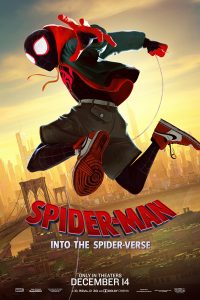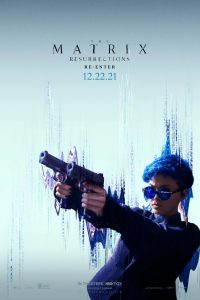Because “Quantum!”: Arley Sorg and Josh Pearce Discuss Ant-Man and the Wasp
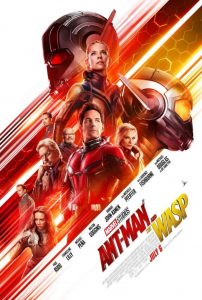 In this sequel to 2015’s Ant-Man, convicted felon Scott Lang (Paul Rudd) has only days remaining on his house arrest when he’s abducted by Hope Van Dyne (Evangeline Lilly) and her father Hank Pym (Michael Douglas) because they believe he holds the key to rescuing Hope’s mother Janet Van Dyne (Michelle Pfeiffer) from the quantum realm where she disappeared 30 years before.
In this sequel to 2015’s Ant-Man, convicted felon Scott Lang (Paul Rudd) has only days remaining on his house arrest when he’s abducted by Hope Van Dyne (Evangeline Lilly) and her father Hank Pym (Michael Douglas) because they believe he holds the key to rescuing Hope’s mother Janet Van Dyne (Michelle Pfeiffer) from the quantum realm where she disappeared 30 years before.
Josh: Hi! What were your initial impressions of this movie?
Arley [after a long pause]: Perfectly “fine.” [Air-quotes included.] It hits the standard beats. There were a few really brief shining highlights but otherwise just a fairly fun movie.
Josh: There was some good humor in the beginning, then drags for a bit, then there’s a great moment in the middle, then drags some more, and then it ends. I like Paul Rudd as a goofy dude. It’s kinda hard to buy him as an action hero, but there were enough funny moments to gloss over it for a while. Having giant ants really breaks the universe for me. It made Ant-Man and the Wasp feel more cartoonish than the other movies in the Marvel Cinematic Universe. Like, an actual cartoon. It felt like it had been adapted from Saturday morning.
Arley: There’s already a disconnect from the rest of the Marvel universe, because Ant-Man’s role in the MCU is totally different from the comics. I didn’t have the problem with it being cartoonish, probably because I’m coming from the comics. The ants are right from the Marvel pages. It all depends on viewer expectations.
Josh: You were brainwashed at an early age. Pre-conditioned to buy this setup.
One of the major weaknesses of the Ant-Man series is how forgettable its movies are. It’s hard to remember, going into this one, that Janet Van Dyne and Hank Pym were the original Ant-Man and Wasp duo, or that Janet vanished into the quantum realm.
Arley: Scott Lang is not the original Ant-Man so they’re cheating the comic book fans by skipping the whole Hank/Janet narrative. Hank Pym invents Ultron, NOT Tony Stark. Also, Scott Lang is fucking useless. All of his actions are forced. Even as a businessman, it’s obvious that the other guys are running the business without him.
Josh: He’s not entirely useless, because he’s “quantumly entangled” with Janet (which is a load of horseshit). But, yeah, pretty much useless.
It’s hard to remember that Scott Lang and Hope Van Dyne were romantically involved at all by the end of the first movie, and hard to remember the reason that Lang is under house arrest. The most memorable pieces of Ant-Man were that Scott Lang was somewhere he shouldn’t have been, therefore accidentally gaining a superpower, and ended up fighting a cool-looking villain who wanted to profit off the same technology. And those parts were only memorable because we recognize their flavors from Sam Raimi’s Spider-Man movies.
The root cause of such plot decoherence is that there are so many fucking writers on this movie. FIVE? Calm down. Get your shit together.
Josh: I came out of the theater thinking this movie needs a science advisor (like how the fuck do you shrink an entire building and still be able to pick it up? Conservation of mass much?) but turns out there actually was a science advisor. So I’d like to give a special shout out to Spyridon Michalakis for doing a shitty job. Or, more generously, for giving good science advice that was completely ignored by the plethora of writers on this hot mess.
A New York Times article called “The Science (and the Scientists) Behind ‘Ant-Man’” discusses Michalakis’ contributions to the Ant-Man movies, saying, “He approves of the movie’s particular take on quantum entanglement, which is a stretch scientifically but narratively satisfying.” It also quotes producer Stephen Broussard: “The movies have to work as movies, so we take a lot of liberties,” which may be true, but it’s hard to argue that these even accomplish that much.
Arley: Again, it’s only hitting the standard beats which is not interesting. Here’s another thing about the plot. [Long beat, checks notes.] It’s fucking cheesy. I felt like there were a lot of cheap attempts at sympathy and character loyalty.
Josh: I call it “cheap pathos” when I see it in a movie.
Arley: We’re supposed to feel sympathy for Scott Lang through these cheesy moments with the daughter because he’s trying to be a good guy. It’s so obvious and heavy-handed that it doesn’t work at all. I’m hyperaware of their faltering attempts.
Josh: YOU CAN’T FOOL ME INTO LOVING YOU.
Arley: Here’s the biggest problem, plot-wise: Van Dyne. Janet.
Josh: The mom?
Arley: Sorry. Hope.
Josh: The she-elf.
Arley: Yeah. You see her as the badass, knows how to do all this shit, and yet Ant-Man saves her three times.
Josh: That was just to give Ant-Man something to do, otherwise he would literally be stuck in the house the whole movie.
Arley: I like powerful women, but she keeps getting undercut in this movie. It’s like Edge of Tomorrow with Tom Cruise. Undercutting how badass Emily Blunt is. There were so many set ups trying to give the Wasp a reason to help Ant-Man. For instance, Ant-Man’s suit was fritzing constantly, randomly, and inconveniently.
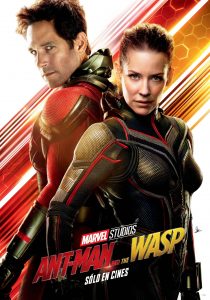 To that point, there were men online throwing a fit because one of the movie posters had Evangeline Lilly in the forefront (in the “traditional male” role) and Paul Rudd standing behind her, which becomes ironic because he ends up being the strong man rescuing the damsel in distress so much anyway. The writers end up undercutting their own undercutting.
To that point, there were men online throwing a fit because one of the movie posters had Evangeline Lilly in the forefront (in the “traditional male” role) and Paul Rudd standing behind her, which becomes ironic because he ends up being the strong man rescuing the damsel in distress so much anyway. The writers end up undercutting their own undercutting.
The other female star of this movie is the supposed villain, Ghost (Hannah John-Kamen), whose character design resembles the Cyborg Ninja from Metal Gear Solid and the Ghost commandos from Starcraft. Able to walk through walls due to “quantum decoherence,” Ghost’s abilities provide some of the best visual scenes and she would be interesting enough to carry an audience past major plot holes in anything other than a movie this generic.
Arley: She was my favorite character because she had actual motivation. Ghost is just trying to survive, talking about being torn apart on the sub-atomic level—
Josh: Quantum level. The magical level.
Arley: —and the heroes just take what they want and leave her. They’re so obsessed and focused on their own mission, and not on helping others, that they skip an opportunity to help someone in need and make a lame attempt at brushing off what they’ve done later. This movie is so badly written that I called it, and I was pissed off that I called it and that it came true.
When supposed heroes can’t recognize that someone else is in need it’s hard to care about any of them at all. The only reason a viewer might care is loyalty or nostalgia from reading the comic books. The characters’ driving motivations in this film are less than believable—the sudden insistence that Hank and Hope would be obsessed with finding Janet after 30 years when that hadn’t seemed to bother them in the first movie at all.
Their stakes begin at, “we need to save our mother,” and never escalate from there. Is Janet even in danger? She’s been in the quantum realm for 30 years and although she appears to age, she doesn’t starve or suffocate. The writers attempt to shoehorn in a sense of urgency and investment by introducing an artificial timeline of something aligning every thousand years or so (which we can’t remember the details of and don’t care about), and a slimeball of a villain named Sonny Burch (Walton Goggins).
Josh: I’ve hated this actor ever since seeing him on The Shield. He’s this super-annoying, dumb redneck character in everything. Not fair to the actor for being typecast, maybe, but I really don’t enjoy every moment with him onscreen. Plus he’s such an extraneous character when there were already so many other under-developed antagonists and obstacles.
Arley: Stupid and poorly written. He serves the very cliché role of standard bad guy dummy. Done all this research, knows who they are, knows where they live, knows their powers, but isn’t prepared to take on superheroes. The whole car-chase scene: at that point he should know everything about them but had no contingency for their abilities and tactics. As soon as he walks on the set in the beginning, I know this is the dummy bad guy that the heroes are going to clown at every turn.
In comparison, Luis (Michael Peña)! Saved the day.
Josh: I was going to completely hate this movie until a certain scene in the middle of the movie saved it from total mediocrity. Michael Peña is a scene-stealer. He’s done it before in other movies, but he took it to another level in this one.
Arley: When you see him, you think, oh no here comes the comic relief, but he’s so good at it. He’s like a magician who says, “Okay, I’m going to trick you now,” and explains the trick to you, and you still can’t figure it out afterwards because he’s so smooth.
Josh: And a brief shout out to the other cast members who helped sell that scene.
One of the easiest ways to reconcile the weakness of the characters and the thinness of the plot is to view everyman Scott Lang as one of us—an outsider thrust into this chaotic scene with no idea of what’s going on or how to react to it. He even makes self-reflective jokes, asking if everyone is just putting the word “quantum” in front of everything, and wondering how another character has time to buy a boat ticket during a high-speed chase scene, deliberately calling out the poor writing. The bad writing may be acknowledged, but that doesn’t stop it from being bad writing. Scott Lang is like us, a guy who just wants to be back home—playing his drums—instead of having to juggle giant ants, black-hatted Southern gentlemen, FBI agents, small-business concerns, and quantum ghost commandos. He doesn’t want to be here any more than we do.
Josh: I think the rest of this series should just be The Wasp. And Luis.
Arley: The movie is weak but when we left we were having fun.
Josh: Because we were drunk. If we had not been drinking, I would have hated this movie. You could probably just watch Clueless and Honey, I Shrunk the Kids back-to-back and get the same general experience. A better experience, even.
If Scott Lang is a stand-in for the viewer, then he seems to constantly be thinking, What are we doing? And, why are we doing this? Good questions. What are we watching? And, why are we watching this?
Directed by: Peyton Reed
Written by: Chris McKenna, Erik Sommers, Paul Rudd, Andrew Barrer & Gabriel Ferrari
Starring: Paul Rudd, Evangeline Lilly, Michael Peña, Walton Goggins, Bobby Cannavale, Judy Greer, Tip ‘T.I.’ Harris, David Dastmalchian, Hannah John-Kamen, Abby Ryder Fortson, Randall Park, Michelle Pfeiffer, Laurence Fishburne & Michael Douglas
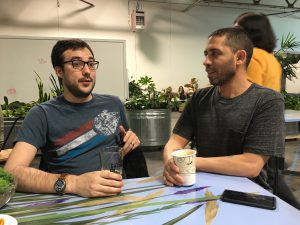
JOSH PEARCE, Assistant Editor, started working at Locus in 2016. He studied creative writing at SFSU and has sold short stories and poems to a variety of speculative fiction magazines. A Bay Area native, he currently lives in the East Bay with his wife and son and spends way too much time on Twitter: @fictionaljosh. One time, Ken Jennings signed his chest.
ARLEY SORG, Associate Editor, grew up in England, Hawaii, and Colorado. He studied Asian Religions at Pitzer College. He lives in Oakland, and usually writes in local coffee shops. A 2014 Odyssey Writing Workshop graduate, he is soldering together a novel, has thrown a few short stories into orbit, and hopes to launch more.
 While you are here, please take a moment to support Locus with a one-time or recurring donation. We rely on reader donations to keep the magazine and site going, and would like to keep the site paywall free, but WE NEED YOUR FINANCIAL SUPPORT to continue quality coverage of the science fiction and fantasy field.
While you are here, please take a moment to support Locus with a one-time or recurring donation. We rely on reader donations to keep the magazine and site going, and would like to keep the site paywall free, but WE NEED YOUR FINANCIAL SUPPORT to continue quality coverage of the science fiction and fantasy field.
©Locus Magazine. Copyrighted material may not be republished without permission of LSFF.




